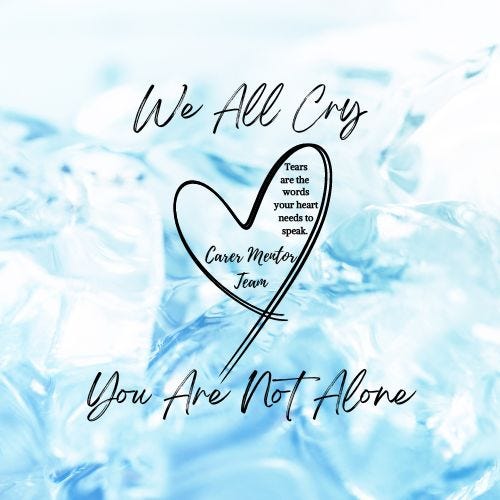'Cry, Baby. Why Our Tears Matter'
A Podcast Interview. Dan Harris and Dr Bianca Harris of Ten Percent Happier with Reverend Benjamin Perry
Dear Friends! Thank you for being here.
For those of you who don’t know me, I’m Victoria. I cared for my Dad through to his passing (the hellish dark days with grains of joy), and now I look after Mum (calmer waters with giggles). In addition. You can read more about why I’m publishing Carer Mentor here: Who Started Carer Mentor and Why?’
‘Caring about Crying. We All Cry. You’re Not Alone.’
Day 3 of the Collaboration
Who knew I could get so excited about crying!? Not me.
Definitely, not after the Prelude to Caregiving or early carer days when punched-flat pillows were drenched with an ocean of tears.
And definitely not now. Since the passing of my Dad in 2020 and the switchover to the second rollercoaster with my mother’s cancer treatment, my eyes have been as dry as the Sahara except in the ‘safe moments’ when stormy sobs can engulf me.
Yet, here I am, leading a collaboration about crying and tears because my curiosity was sparked by four articles and twelve other authors/creators have accepted my invitation to join me on this mindful exploration. Sept 1 Launch article: Caring About Crying. We All Cry. You’re Not Alone
Tissues at the ready, please!
References For our collaboration - A Discovery!
As with all Carer Mentor articles, I wanted to ensure we had some resources and references we could share and lean into when we started building our articles.
I began researching clinical studies and books. There were children’s books, some clinical studies, such as William Frey’s work1.
Frey demonstrated a greater concentration of proteins in ‘Emotional tears’ than in ‘Reflex or basal tears’. You can read more facts about tears and crying here: Crying, Did you know?
Then I found a podcast called Ten Percent Happier, where Dan Harris2 (a former ABC News presenter and Journalist) and his wife, Dr. Bianca Harris3 (a pulmonary and critical care medicine specialist at Memorial Sloan Kettering Cancer Center) interviewed Reverend Benjamin Perry.
What a discovery!
After listening to the interview, I transcribed it and bought the book. You may feel the need to do the same thing after you’ve heard it.
Reverend Perry, Ben is a clear expert on the subject of tears.
He’s not just book-smart and eloquent; he offers listeners deep personal and interpersonal insights.
Some interviews can feel like a lecture or dogmatic. Not this one!
In the interview, Dan, Bianca, and Ben had a very open, human conversation that openly explored, shared and curiously exchanged viewpoints without judgment.
This is a great example of fostering psychological safety (Spoiler alert: Bianca cries more openly than Dan and they discuss how that has affected their relationship)
Here’s a summary of some of the key points from the podcast interview.
Ben’s personal journey: At 21, he realised he hadn't cried in years and then explored crying daily for several months. This led to significant emotional changes, learnings and insights.
Gender differences (if the binary male female classification is used in clinical studies): Research shows men cry less frequently than women, with the median number of crying events for men in a month being zero.
Potential hormone link: a link between different hormones (like testosterone) and crying frequency, based on anecdotal evidence from transgender individuals
Emotional depth: Ben emphasises that crying is a "canary in the coal mine" for deeper emotional life, encouraging focus on feeling deeply rather than just trying to cry more.
Societal impact: Cultural norms, particularly patriarchal structures, often encourage suppressing emotions, especially in men
Mindful approach: Ben suggests being curious about why we cry, using it as a signal-tool for self-discovery and better understanding of emotions
Benefits of crying: ability to reveal deeper emotions and foster connection with others
Connection and evolution: Crying is seen as a way to solicit care and connection from others, fostering relationships and empathy
I’ve finished the book, and have highlights, notes and many new insights in my journal.
Then a magical thought appeared…what if?!?
WHAT IF Reverend Benjamin Perry is here, on the same publication platform as Carer Mentor.
Guess What…
Hello Ben!
A Special Guest: Reverend Benjamin Perry
‘Author of Cry, Baby: Why Our Tears Matter. Queer + building church that reflects God’s own queerness. Christian nationalism makes Jesus weep. he/they’
Here’s Ben’s Bio from his Website
Rev. Benjamin Perry is Minister of Outreach and Media Strategy at Middle Church, and author of Cry, Baby: Why Our Tears Matter, published by Broadleaf Books, May 2023.
An award-winning writer, his work focuses on the intersection of religion and politics. Their writing can be found in outlets like The Atlantic, The Washington Post, Slate, The Huffington Post, Sojourners, Bustle and Motherboard and he has appeared on MSNBC, Al Jazeera, and NY1. They hold a degree in psychology from SUNY Geneseo and a Masters of Divinity from Union Theological Seminary.
He is married to Erin Mayer, they live in Maine with his brother and best friend. They are the editor of the Queer Faith photojournalism series, curator of an art exhibit by the same name, and a passionate advocate for building Church that lives into God’s blessed queerness. His two proudest achievements are skydiving with his grandmother and winning first prize in his seminary drag show.
Ben has kindly accepted our invite to a short conversation, Q&A.
Tomorrow, in Part 2, Ben and I will be exchanging thoughts and insights about crying and why tears matter.
Please ‘❤️’ LIKE the article.
The Caring About Crying Anthology. We All Cry. You’re Not Alone.
Sept 1 Launch article: Caring About Crying. We All Cry. You’re Not Alone By Victoria at Carer Mentor: Empathy and Inspiration
Sept 2 Crying: 'Did you know?' Resource: Tears the science and some art. By Victoria at Carer Mentor: Empathy and Inspiration
Frey, W. H.; DeSota-Johnson, D.; Hoffman, C.; McCall, J. T. (October 1981). "Effect of stimulus on the chemical composition of human tears". American Journal of Ophthalmology. 92 (4): 559–567. doi:10.1016/0002-9394(81)90651-6. ISSN 0002-9394. PMID 7294117. Abstract:
We examined the effect of the nature of the stimulus on the chemical composition of human tears. The protein concentration of emotional tears from women exceeded that of irritant-induced tears by 24% (P<.01). Polyacrylamide disk gel electrophoresis disclosed no significant difference between the distribution of positively or negatively charged proteins of irritant-induced and emotional tears. Manganese concentrations in tears (30 ng/ml) exceeded serum concentrations from the same subjects by 30-fold. These manganese concentrations in tears were considerably less than previously reported values. We found no differences for the concentrations of protein or manganese in human tears between the sexes.
Daniel B Harris is a retired American journalist for ABC News. He was an anchor for Nightline and co-anchor of the weekend edition of Good Morning America.
Dr. Bianca Harris is a specialist in pulmonary and critical care medicine at Memorial Sloan Kettering Cancer Center. Her expertise is in treating patients who have been admitted to the hospital ward or intensive care unit with breathing problems due to cancer and its related treatments. Over the past few years she has also been writing a personal narrative on imposter syndrome as it pertains to women in academic medicine. Lastly, she diverts much attention to raising her son (Alexander), husband (Dan) and 3 cats (Ruby, Toby and Steve).









Thank you for introducing us to Rev. Perry and their book - planning to listen to the podcast today and looking forward to the interview!
I've got this episode of 10 Percent queued up for later today! Thanks, Victoria!